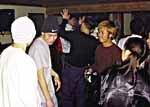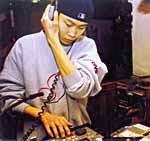|
Lucy Su, 24, is a staff
nurse at a Beijing hospital. At night she trades in
her white uniform for khaki combat pants and a baggy
sweater, lets her long African-braided hair fall all
around her delicate features, and heads for hip-hop
music enclave Left Bank (on Workers Stadium North Road
next to Club Vogue). Su says she and other regulars
are drawn together by their love for hip-hop's soulful,
rhythmic sound and its hip, urban image.
"While most of my classmates
were listening to Chinese popular music, I was falling
in love with music from the States," says Su. "I just
love everything about it, from the rhythm and rhymes
to the way we can express ourselves in terms of fashion."

While the mechanical,
pumping beats of House music continue to pack next-door-neighbor
Club Vogue each weekend, Left Bank has been quietly
nurturing the city's new hip-hop scene. Situated just
a few hundred meters north of City Hotel, this unassuming
bar displays all the traits of being 'underground.'
Dim lights lend it an air of mystery and secrecy and
veiled faces gaze out from dark corners. Behind a makeshift
booth, two DJs spin tunes on a CD player. Almost everyone
here is in their late-teens and early-twenties, high
school and college students, and young professionals
from the far corners of the globe. Clustered around
the bar, they all share one thing in common: passion
for a musical phenomenon whose roots lie in inner-city
American rap.
Rap music - with its
blend of reggae and blues, and improvised word rhyming
(later known as MCing) - originated in American cities
in the 1970s and went on to transform the Stateside
music scene. This revolutionary style and sound was
first honed by young African Americans and Latinos who
mixed records and practiced 'breakdance' moves on make-shift
platforms in parks, playgrounds, and nightclubs, predominantly
in New York City. It was then captured on vinyl and
commercialized over the next 20 years to become one
of the most influential and popular world-wide musical
genres since rock-and-roll.
Despite Beijing's paltry
exposure to the 20-year development of U.S. rap music
and the culture stemming from it, Left Bank is still
able to evoke part of the playground essence of early
hip-hop and is home to some of the music's most avid
fans in Beijing. Most of these kids stumbled randomly
across a CD by luck or word-of-mouth and are attracted
as much by its blend of syncopated beats and rhymes
as they are by the image and attitude of celebrity rap
artists.
Sensing the demand,
Left Bank owner Xiu Tin opened the bar three months
ago with a chill den for hip-hop in mind.
"I wanted to create
somewhere different for people to relax and meet friends
in an environment where they feel at home," Xiu says.
Wu Yi, a college student
and part-time DJ, is part of a clique of Beijing skateboarders
who spend their free time between skating and keeping
up with the latest hip-hop tunes. Left Bank owner Xiu
does more than give Wu and his buddies a place to listen
and hang out. They get to choose whatever music they
want.
"We come here because
this is an integral part of this culture. In the summer
we're all out skateboarding, but in winter we hang out
here and play our music," Wu says.
Softly spoken, sporting
a blue baseball cap, the only betrayal of Wu's passion
for rap music is a case-full of CDs, which he clutches
tightly at his side. Throughout conversations, he opens
the case excitedly, and constantly makes reference to
a seemingly endless list of rap artists. Despite his
lack of spoken English, Wu can quote any number of rap
masters, from Wu-Tang Clan to Mos Def, with an uncanny
sense of fluency and rhythm.
"Most of the rap I can't
understand, but I have friends who tell me what the
lyrics mean. The words become very personal to me,"
Wu says.
Hip-hop culture in Beijing
doesn't end at Left Bank and a few other clubs, such
as Haidan's Solutions, that offer hip-hop nights through
the week. Wu and fellow DJ Song Fei are part of a growing
alternative music consumer group in Beijing that feeds
an underground compact disc market. Many music fans
first heard the infectious beats of R&B while hunting
through CD shops in university areas such as Wudaokou
in Haidian district. These 'da kou' CDs - a term to
describe discs which are partially destroyed and resold
- are quickly becoming the only affordable way to purchase
a wide variety of contemporary, alternative music, especially
music from overseas.
The latest hip-hop trend
echoes the discovery of a musical genre that speaks
to the ordinary lives of Beijing's youth as it did 20
years ago to urban kids in the States. It also signifies
how young Chinese are making a conscious choice against
more commercial, less soulful tunes, like techno, pumped
out in nightclubs across China. Against overcrowded,
overpriced clubs playing faceless house music to expressionless
crowds, hip-hop gives young people a fresh opportunity
to listen to music that they feel speaks from the heart
and a lifestyle through which they can express their
independence.
Xiao Long, 16, an unemployed
high school dropout, started listening to hip-hop two
years ago and has been MCing ever since.
"People used to listen
to house but they found it too hard and fast. People
are looking for something that offers them real meaning,"
says Xiao Long. "For me, rap music is special. It comes
from the heart, talks about issues of everyday life,
about the problems of being young in the city. It is
utterly unique."
This isn't the first
time hip-hop has gained popularity in Beijing. As such,
some are pessimistic about its future and the scene's
ability to sustain itself over time. Some, like Xiao
Weng, one of Beijing's few DJs to record his own hip-hop
mixes, has seen events like those at Left Bank held
on-and-off at bars since the early 1990s. In all cases,
the trend never fully developed into a permanent music
scene, he says. One crucial factor is the inaccessibility
of vinyl records, a major component in hip-hop culture.
Many DJs in Beijing must rely on mixing compact discs,
making it harder to compete with the demands of the
city's constantly changing music trends.
"What's fashionable
in Beijing is such a transient concept," Xiao Weng says
with a sigh. "One minute it's rock, then it's house,
then techno. Unless the DJs here can have access to
proper turntables and records to play with, hip-hop
will never fully develop."
Left Bank holds hip-hop
nights on Tuesdays and Saturdays.
|




